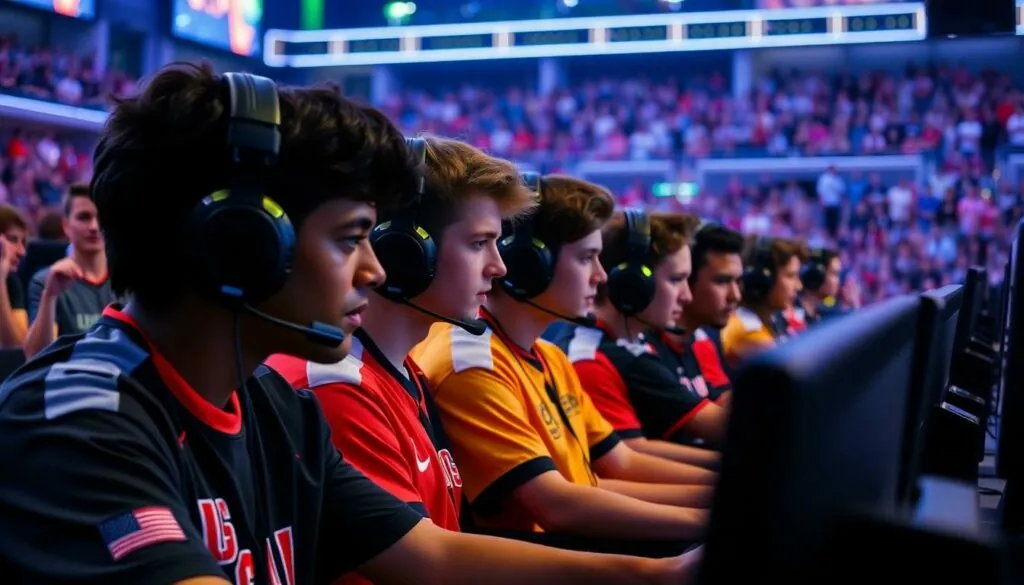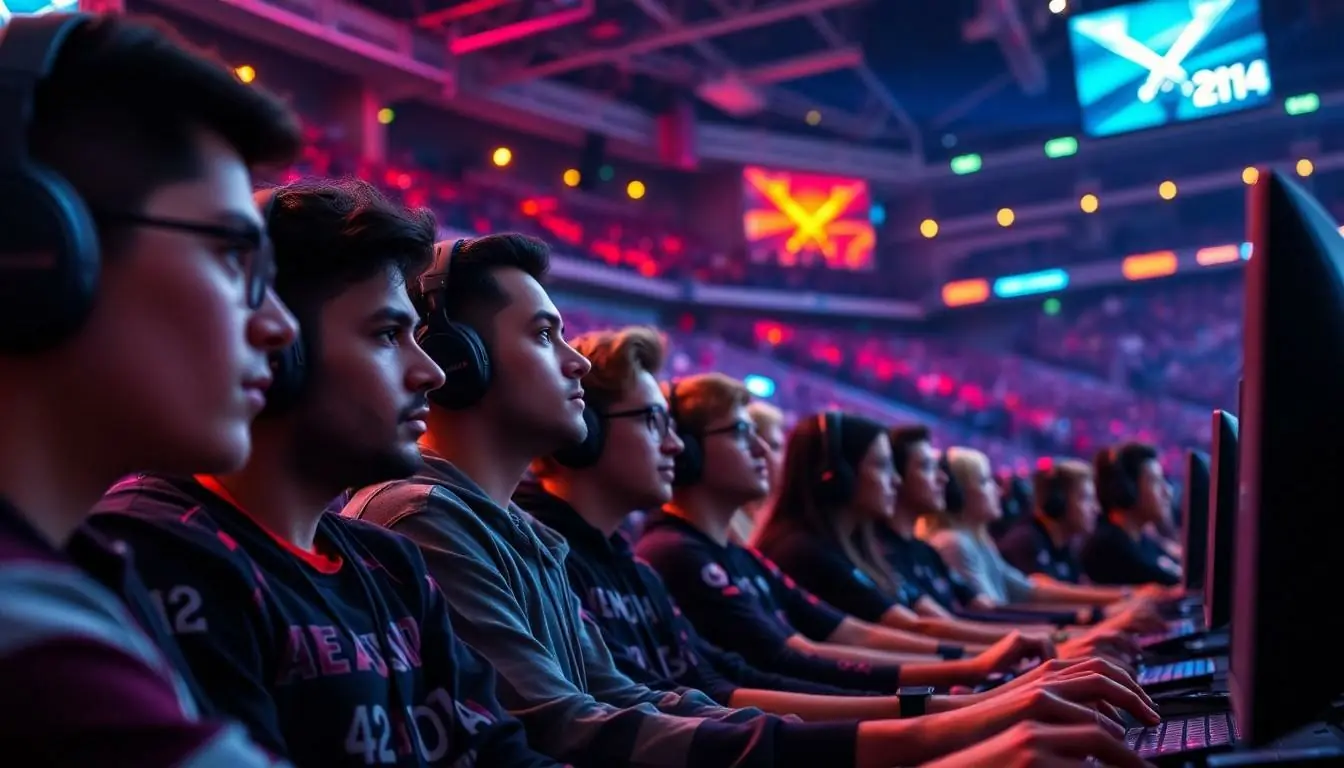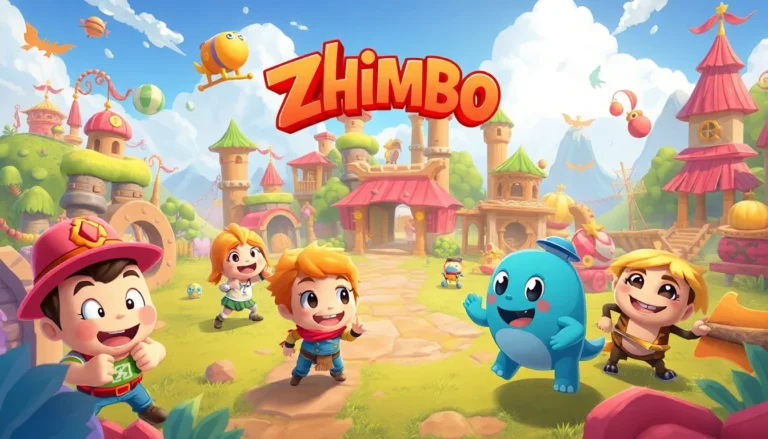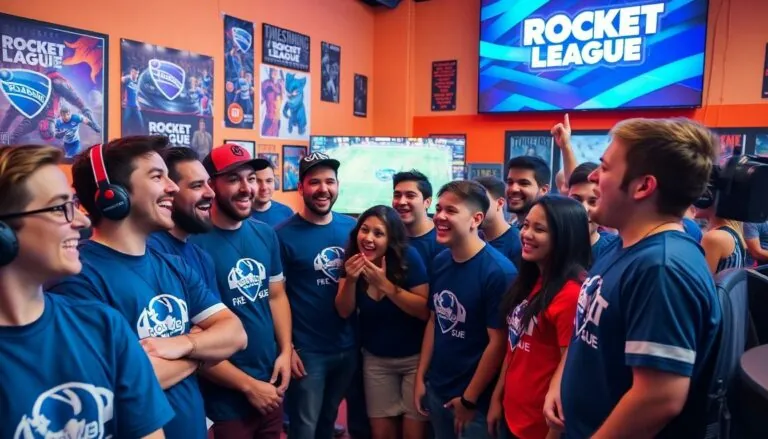In a world where athletes can now battle it out from the comfort of their couches, the debate around whether esports qualify as real sports is heating up. Picture this: intense competition, lightning-fast reflexes, and a crowd roaring with excitement—all without a single drop of sweat on a gym floor. Sounds like a sport to them, right?
Table of Contents
ToggleUnderstanding Esports
Esports refers to competitive video gaming, combining skill, strategy, and teamwork. Its growing popularity gives rise to questions about its classification alongside traditional sports.
Definition of Esports
Esports incorporates organized, multiplayer video game competitions, often between professional teams. Participants engage in various genres like first-person shooters, real-time strategy, and multiplayer online battle arenas. Major esports titles include League of Legends, Dota 2, and Counter-Strike: Global Offensive. Viewers typically watch these events live on streaming platforms, contributing to esports’ vibrant community and culture. Some recognize it as a sport due to its competitive nature and professional infrastructure, including leagues, sponsorships, and prize pools.
History of Esports
Esports traces its roots back to the early 1970s with the first known video game competition hosted at Stanford University. The 1980s saw the emergence of arcade games, fueling competitive play and spectator interest. In the late 1990s, esports gained significant traction due to the rise of faster internet connections and online gaming. The introduction of games like Quake and StarCraft laid foundational competition structures. By the 2010s, it transformed into a multi-billion-dollar industry, featuring large-scale tournaments with massive global audiences. Growth continues as new technologies and platforms enhance the esports experience.
The Debate: Are Esports Sports?
The classification of esports as sports sparks lively discussions. Advocates emphasize the competitive aspects, mirroring traditional sports.
Arguments in Favor
Skill forms a major component of esports, showcasing player abilities comparable to physical athletes. Coordination, strategy, and quick decision-making play crucial roles in successful gameplay. Tournaments draw large crowds, similar to conventional sporting events, creating an electrifying atmosphere. Financial investments support esports with sponsorships, advertising, and media rights, demonstrating its commercial viability. Recognized governing bodies, like the International Esports Federation, aim to regulate competitive gaming, solidifying its legitimacy alongside traditional sports.
Counterarguments Against
Critics argue that esports lack physical exertion typical of traditional sports. Detractors cite the absence of physical activity as a defining element of sports. Concerns surrounding mental health arise, with high-stress environments potentially leading to burnout among players. Additionally, some maintain that reliance on technology distances esports from the classic definitions of sports. Finally, the limited lifespan of games may impact viewer and player engagement in long-term competitive settings.
Physical vs. Mental Skills
Esports demand both physical and mental skills, contributing to the debate about their status as real sports.
The Role of Physicality in Sports
Physicality plays a vital role in traditional sports, characterized by athleticism and physical exertion. Athletes train rigorously to enhance their strength, endurance, and agility. Skill sets vary across sports, with basketball requiring quick lateral movements and soccer focusing on speed and stamina. In contrast, esports players experience less physical demand, primarily engaging in dexterity with controllers or keyboards. Some argue that even minimal physical exertion in esports doesn’t align with traditional definitions of sports. Nonetheless, certain elements, such as hand-eye coordination and sustained focus, reveal physical skills necessary for success in competitive gaming.
Cognitive Skills in Esports
Cognition significantly impacts gameplay in esports, where strategy and decision-making drive performance. Players must process information rapidly, reacting to complex scenarios within seconds. Critical thinking enables gamers to adapt to their opponents’ strategies while maintaining their own. Team dynamics require communication and collaboration, further enhancing cognitive skills. Moreover, success in esports hinges on mental resilience, as players endure high-pressure situations during tournaments. Many psychological aspects mirror those in traditional sports, showcasing the importance of mental fortitude in gameplay. As the esports landscape evolves, recognizing cognitive skills becomes essential in validating its place among traditional sports.
Recognition and Legitimacy
The debate about esports’ status continues as various organizations explore their legitimacy. One significant platform for this discussion is the Olympics.
Esports in the Olympics
Esports gained attention when the International Olympic Committee (IOC) considered including it in future Olympic events. Proposals to feature esports alongside traditional sports aim to attract younger audiences. Demonstrating competitive merit, games like League of Legends and Dota 2 portray skills akin to those found in conventional athletic competitions. Critics, however, question whether the inclusion aligns with the Olympic spirit, emphasizing physicality over virtual prowess. Engaging millions worldwide, esports’ potential presence in the Olympics reflects its growing importance in the global sporting landscape.
Governing Bodies and Regulations
Various governing bodies aim to standardize and regulate esports, enhancing its legitimacy. The International Esports Federation (IESF) serves as a primary organization, providing structure and oversight for competitive gaming. Regulations set by governing bodies ensure fair play and establish standardized rules for competitions. Multiple regions also boast local esports leagues, promoting growth and organization at the grassroots level. Collaborative efforts between these entities seek to unite esports under global standards, similar to other traditional sports. As the esports landscape matures, robust regulatory frameworks will help solidify its place in the broader sporting ecosystem.
Conclusion
The classification of esports as sports remains a contentious topic. As competitive gaming continues to grow and evolve it challenges traditional notions of what constitutes a sport. The skills required in esports such as strategy coordination and quick reflexes mirror those found in traditional sports.
Despite criticisms regarding physical exertion the mental acuity and teamwork involved in esports cannot be overlooked. With organizations striving for regulation and recognition the future of esports holds potential for broader acceptance within the sporting community. As the lines between physical and mental competition blur the debate will likely persist but the legitimacy of esports is gaining traction in the eyes of many.







